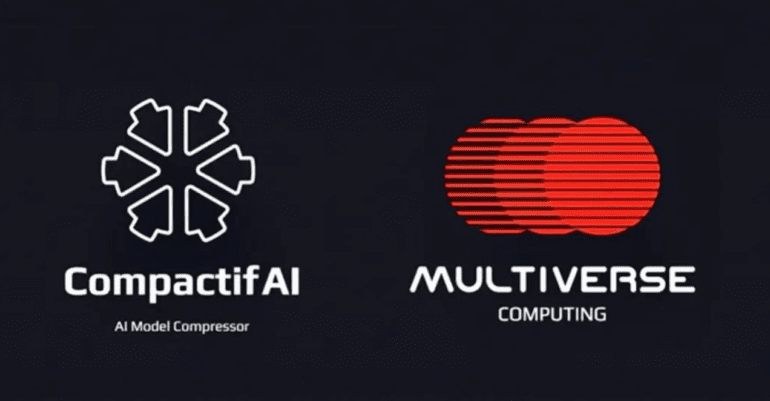TL;DR:
- Multiverse Computing introduces CompactifAI to optimize large language models (LLMs) and reduce energy consumption.
- CompactifAI employs tensor networks to reduce model parameters, making LLMs more efficient.
- The software minimizes energy requirements during training, operations, and retraining of LLMs.
- It enhances LLM portability, enabling deployment in edge applications like autonomous vehicles.
- The growing energy demands of LLMs pose significant challenges for the industry.
- CompactifAI offers three compression levels, catering to diverse LLM applications.
- Tensor networks, initially used in physics, play a vital role in this innovation.
- CompactifAI is set to transform LLM development and deployment.
Main AI News:
Multiverse Computing, a leading global provider of quantum computing solutions, has unveiled CompactifAI, a cutting-edge solution aimed at addressing the high computational costs associated with machine learning algorithms. This groundbreaking tool is designed to tackle the substantial energy demands required for the training and execution of large language models (LLMs) such as ChatGPT and Bard. CompactifAI promises to drive down development costs while facilitating the seamless integration of these models into a wider array of digital services.
At its core, CompactifAI leverages tensor networks to achieve a reduction in the number of parameters within a model, resulting in a more compact size and reduced memory and storage space requirements. This innovation also offers the potential for quicker retraining, allowing users to incorporate new data into a previously compressed model, thereby generating an updated version that maintains the advantages of compression while preserving the quality of results.
Beyond its size and efficiency improvements, CompactifAI is strategically engineered to minimize energy consumption at various stages in the lifecycle of an LLM, spanning the training phase, general operations, and retraining. This software transformation not only reduces the overall footprint of these models but also enhances their portability, making them easier to deploy at the edge in applications like autonomous vehicles and remote production facilities.
Enrique Lizaso Olmos, CEO of Multiverse Computing, shared his perspective on the significance of CompactifAI: “This new tool will alleviate a significant impediment to the proliferation of large language models across industries: the sheer scale of these algorithms, their datasets, and the energy required to operate them. CompactifAI also paves the way for new LLM use cases, whether on-premises, at the edge, or in other scenarios where dedicated cloud connectivity may not be available.”
Recent research on AI energy consumption projects that by 2027, global annual electricity consumption related to AI could rival the yearly energy consumption of entire countries such as the Netherlands, Argentina, and Sweden. These projections are based on estimations of the energy required to power the servers hosting the most widely-used LLMs, factoring in increased usage as these models become integrated into popular search engines and other elements of internet infrastructure.
Large language models already demand a substantial amount of energy, both during their training phase and in daily operations. According to a University of Washington researcher, a single LLM could consume as much as 10 gigawatts of power during its training phase—an amount equivalent to the annual energy usage of over 1,000 U.S. households. To handle hundreds of millions of daily queries, these models could potentially consume up to 1 gigawatt of power per day, roughly equivalent to the daily energy consumption of 33,000 U.S. households.
Rafael San Juan, Global Innovation Manager at Iberdrola, one of the world’s largest electric utility providers and a Multiverse customer, highlighted the importance of innovative solutions to optimize resource utilization: “LLMs demand significant energy, computational power, and memory resources during their training process and lifecycle. An innovative solution capable of optimizing resource usage has the potential to revolutionize the landscape, minimizing the impact on the electric grid and enabling the true scalability of LLM solutions.”
CompactifAI offers three levels of compression for models—low, medium, and high—tailored to meet the specific application requirements of individual LLMs. Multiverse anticipates that AI developers will be the initial beneficiaries of this software-as-a-service platform.
Tensor networks, originally employed in the study of condensed matter physics, provide a visual language for describing intricate systems. This visual language simplifies the comprehension of how each component interacts within the system and facilitates predictions regarding the outcomes of these interactions. Extracting information from tensor networks is a relatively straightforward process, adding another layer of advantage to this computational approach.
Multiverse Computing’s Chief Science Officer, Roman Orus, was among the early pioneers to explore tensor networks during a research fellowship at the University of Queensland in 2006. As a co-founder of the company, he applied this knowledge to one of Multiverse’s inaugural projects: leveraging tensor networks for portfolio optimization with a multinational bank. In recent times, researchers have harnessed tensor networks as models for machine learning architecture and for compressing layers within neural networks. Furthermore, tensor networks can be directly mapped to quantum circuits. Experts in the field anticipate that tensor networks will bridge the gap between today’s noisy quantum computers and the fault-tolerant machines of the future.
Conclusion:
CompactifAI’s launch by Multiverse Computing is a game-changer in the market, offering a comprehensive solution to the escalating energy demands of large language models (LLMs). With its ability to reduce energy consumption, enhance efficiency, and enable edge deployment, CompactifAI addresses key challenges facing the industry. This innovation positions Multiverse Computing at the forefront of LLM development and signifies a significant step toward sustainable and scalable AI solutions.

